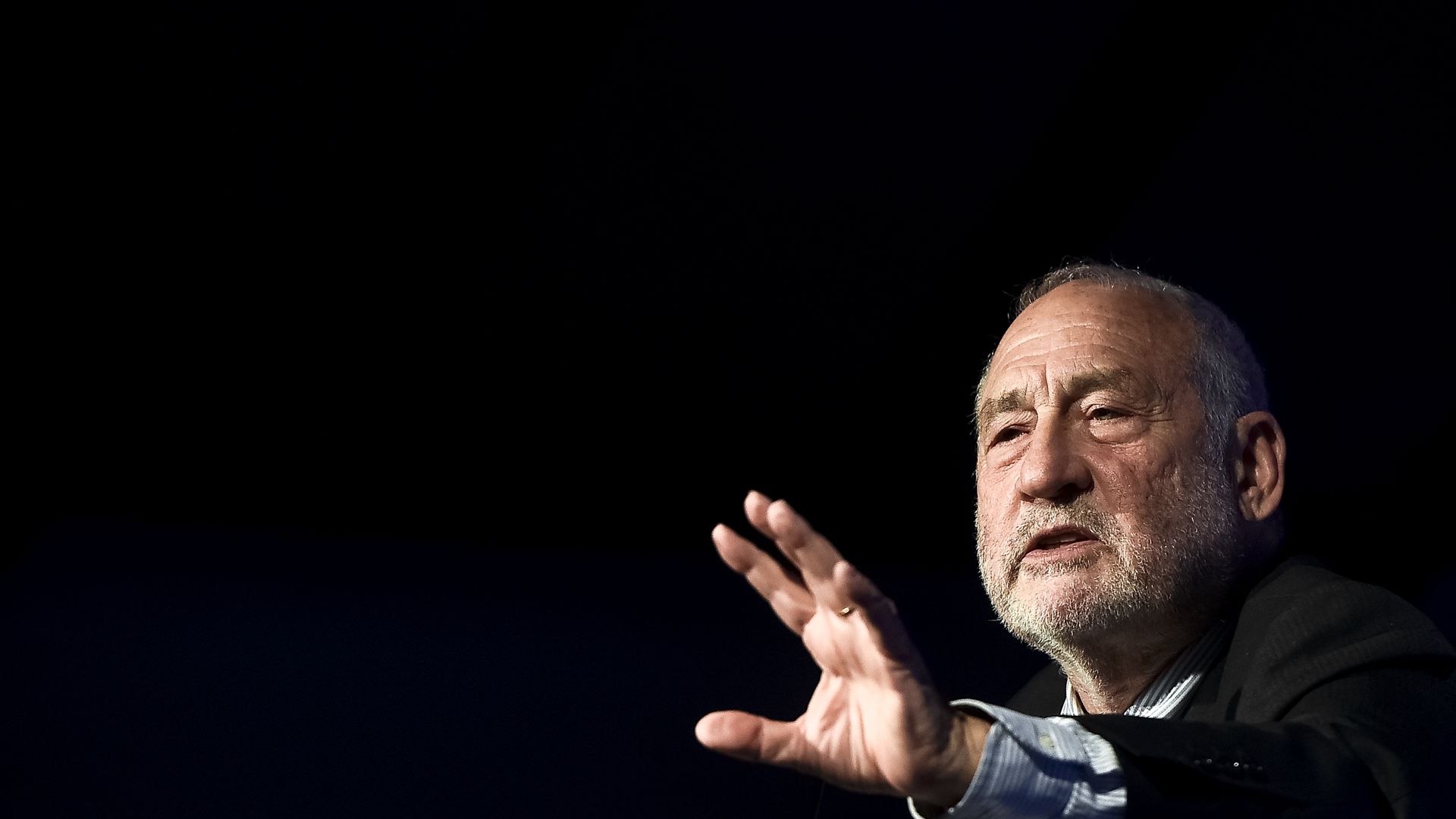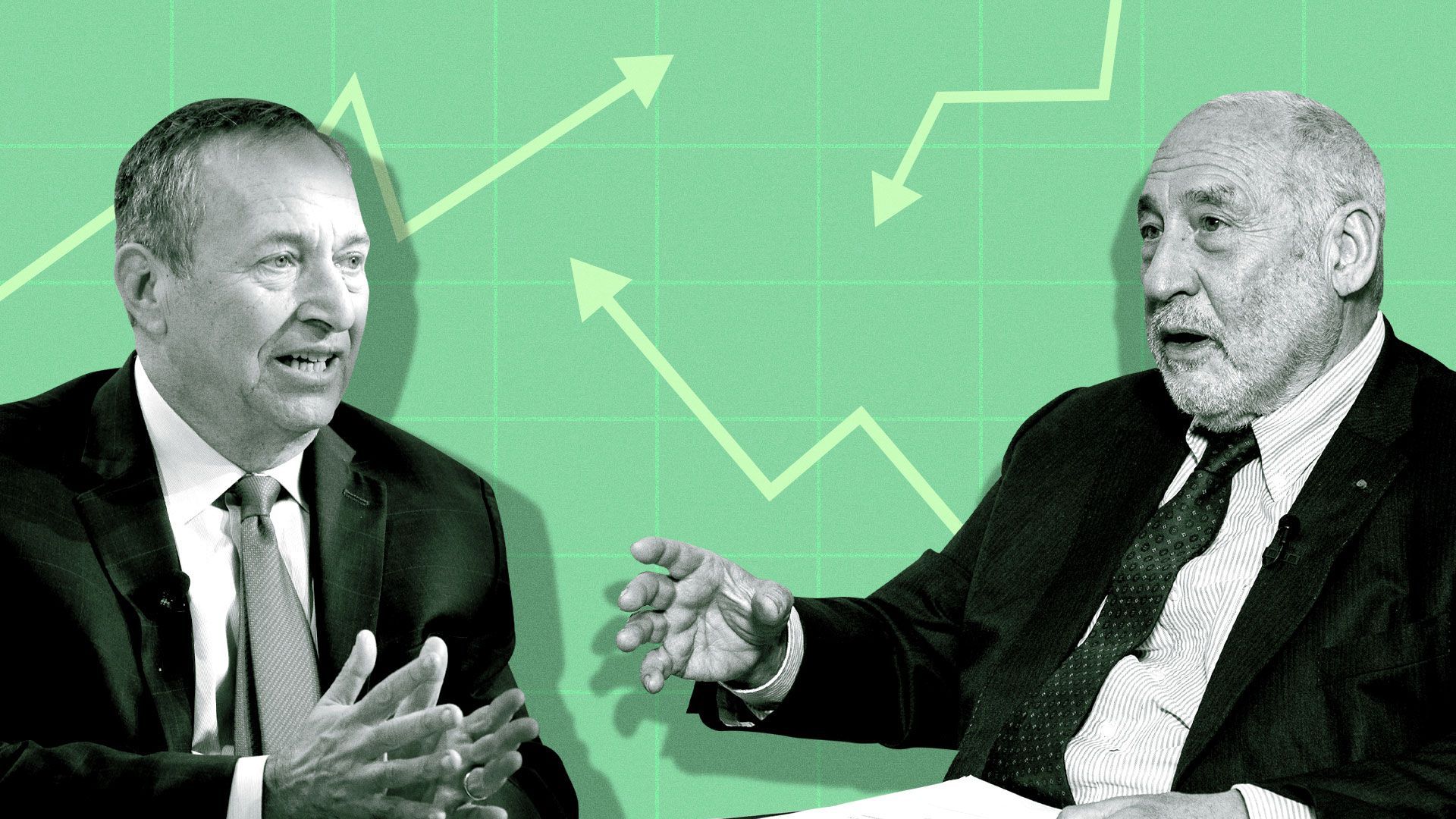| | | | | | | Presented By J.P. Morgan Wealth Management | | | | Axios Markets | | By Dion Rabouin ·Mar 30, 2021 | | Good morning! Was this email forwarded to you? Sign up here. (Today's Smart Brevity count: 1,217 words, 4.6 minutes.) 🎙 "Why wait until tomorrow, Mr. Stoeckl? Let us make the treaty tonight." - See who said it and why it matters at the bottom. | | | | | | 1 big thing: Stiglitz says Biden's spending could mean "a new world" |  | | | Photo: Nicolò Campo/LightRocket via Getty Images. | | | | One of the world's most respected economic authorities says he not only endorses President Biden's proposed $4 trillion infrastructure spending plan but expects that it could break the U.S. out of the low-growth, low-inflation environment that has existed for the past 20 years. Why it matters: The combination of Biden's $1.9 trillion coronavirus relief plan and the expected Build Back Better program, could mean the U.S. is "in a very good position to get back into a more normal economy," Nobel Prize-winning economist Joseph Stiglitz tells Axios in an exclusive interview. - "We've been for the last two decades in an abnormal environment, we've been in a bad equilibrium trap."
- "The inequality means people don't have demand, a lack of demand means we don't invest, so we've been in a very bad, vicious circle and I'm optimistic that this may break us out into a new period of strong growth, which is more egalitarian."
The big picture: U.S. growth has been stuck at around 2% since 2000, averaging 2.1% a year, compared to the country's long-run average of closer to 4%. - Economists have argued about whether the growth decline is a result of increasing debt, rising economic inequality, declining investment and other reversible trends or is simply the consequence of an aging population and natural factors.
Where it stands: If Biden's proposals become law, "We're going to heat up the economy," Stiglitz says. - "We're going to be investing, spending money on education, child care, a whole variety of expenditures across the spectrum and not just giving money to the very rich but giving money to people who actually spend it."
- "That will create more demand and that should give people more confidence to invest."
Don't sleep: That investment should also mean the Fed can pare back its exceptional monetary policy, Stiglitz adds, and allow markets to function more normally. - "Now we're in a new world, and the defining characteristic is that fiscal policy is back."
- "As we become more secure that we are in the path of recovery, backstops become less important, it's easier for them to be phased out, and over time we'll go back to more normal monetary policy, interest rates will go back to normal."
Yes, but: "I caution this by saying that we are in very uncertain territory," the former World Bank chief economist, White House adviser and chairman of the U.N. commission examining reforms of the international monetary and financial system warns. - "None of us know fully the nature of the scarring of the economy."
|     | | | | | | Bonus quote: Lawrence Summers "didn't really think it through" |  | | | Photo Illustration: Eniola Odetunde/Axios. Photos: Bloomberg, Stefano Guidi (Stringer) /Getty Images | | | | Stiglitz says he is unbothered by inflation concerns raised by economists and market participants recently and thinks former Treasury Secretary Lawrence Summers wasn't thinking when he published his recent op-ed in the Washington Post. What we're hearing: Summers warned about the potential for "inflationary pressures of a kind we have not seen in a generation, with consequences for the value of the dollar and financial stability," but Stiglitz tells Axios that worry about inflation today is "certainly premature" and "totally unnecessary." Say it with your chest: "I think he didn't really think through what he was saying because the irony was that we've been in a long period where we've been facing lack of aggregate demand at the national and global level," he says. - "So there's an awful lot of scope to increase demand, both in terms of the American Reinvestment Act and new infrastructure [bill] to bring us back into a more normal world where we don't face that deficiency of aggregate demand."
- "The irony is that he himself had talked about the secular stagnation, which means a lack of aggregate demand."
Be smart: Stiglitz also argues that because the U.S. has such high economic inequality it is in a unique position to tamp down on inflation should it arise because not only can the Fed raise interest rates, but Congress can raise taxes without hitting those still struggling. - "One of the ironic advantages of having a society with as much distortion inequality as we have is that we can raise a lot of revenue by taxing only those with incomes over $400,000 and corporations," he says.
- "The very fact that there's so much money at that top gives us a lot of leeway for imposing taxes."
|     | | | | | | 2. Catch up quick | | President Biden announced 90% of U.S. adults will be eligible to get a COVID-19 vaccine in three weeks, and the number of pharmacies where shots are available will double. (White House) Saudi Arabia is prepared to support extending OPEC+ oil production cuts into May and June and extend its own cuts in order to boost prices. (Reuters) Cathie Wood's Ark Investment Management altered the prospectuses for its ETFs to remove a 30% cap on how much of each fund's assets could be invested in the securities of a single entity, and a 20% limit on the number of a company's shares an ETF could own. (Bloomberg) |     | | | | | | A message from J.P. Morgan Wealth Management | | 200 years of expertise, in the palm of your hand | | |  | | | | Get the tools and information you need to make smarter investing decisions with J.P. Morgan Wealth Management. Here's how: When you trade commission-free on the Chase Mobile app, you get access to timely investment research and insights, and a support team of real people. Learn more. | | | | | | 3. 2021's top asset: Lean hogs |  Data: FactSet; Chart: Axios Visuals Thanks to declining production and bullish expectations for greater demand and more grocery shopping, prices of lean hogs are through the roof in 2021 and have become the world's top-performing major asset. What's happening: Prices have risen by more than 60% over the past year, with the overwhelming majority of that growth taking place in 2021 (up 50% year to date), as the commodity has broken out since January. - Prices rose to their highest since Sept. 2014 last week and there's still room to run, experts say.
How it works: USDA recently revised its forecast of U.S. per capita pork consumption to 52.5 pounds per person for this year, the highest it has been since 1981. - Concurrently, USDA's latest hogs and pigs report shows inventory down about 3% from last quarter and 1.8% from last March. That's the first March-over-March reduction since 2014, according to Jason Franken, agricultural economist at Western Illinois University.
- "With continued strong grocery store demand and further prospects for restaurant re-openings as more U.S. citizens are vaccinated against COVID-19, the market looks promising," Franken tells the Farm Journal.
Don't sleep: There also appears to be plenty of room in cold storage, Franken says. According to the latest USDA cold storage report, cold stocks of pork are up 7% from the previous month but down 24% from a year ago. - That's well above the change for poultry — stocks are down 3% from the prior month and 14% from a year ago — and beef — down 2% from the prior month, but up 3% from last year.
The big picture: The supply/demand mismatch along with consistently lower slaughter rates are pushing expectations higher and putting a floor under prices. |     | | | | | | 4. Breaking down the blowup at Archegos | | Axios' Felix Salmon and Courtenay Brown write: The market madness of 2021 is getting crazier. Driving the news: Banks warned Monday of big hits from their dealings with a U.S.-based hedge fund — widely reported to be major investment firm Archegos. What's happened: Archegos imploded — against a backdrop of other mania — all while the SEC is investigating U.S. markets to try to determine what might be amiss here. The latest: Archegos was overleveraged. It made massive stock bets with borrowed money — largely hidden from plain sight because it used derivatives and operates as a family office. - Banks demanded the firm put up more collateral as prices of stocks started to fall.
- When Archegos couldn't do so, banks started a fire sale of their stock holdings.
The backdrop: The Archegos blowup comes on the heels of (but is unrelated to) the bankruptcy of Greensill, a finance house based in London. - Elsewhere, SoftBank is reportedly the subject of an investigation into its foray last year into options trading in U.S. technology stocks — a trade so big that some people consider it to have been market manipulation.
- The SPAC craze also is being investigated.
- The frenzy in GameStop and other meme stocks is being looked into "from a number of different angles," the SEC said last month.
|     | | | | | | A message from J.P. Morgan Wealth Management | | Get an investment check-up with a J.P. Morgan Advisor | | |  | | | | Your J.P. Morgan Advisor: - Develops smarter, personalized wealth-building strategies that fit you and your goals.
- Meets with you regularly to help keep your portfolio on track.
- Keeps you up to date on important market changes and how they might impact your portfolio.
Learn more. | | | | Thanks for reading! Quote: "Why wait until tomorrow, Mr. Stoeckl? Let us make the treaty tonight." Why it matters: On March 30, 1867, the U.S. purchased Alaska from Russia for $7.2 million, or roughly 2 cents an acre. - Edouard de Stoeckl was the Russian minister to the United States who in 1856 recommended selling Alaska to the U.S.
- The quotation comes from then-Secretary of State William Seward who oversaw negotiations from the U.S. side.
Read more. | | | | Axios thanks our partners for supporting our newsletters.
Sponsorship has no influence on editorial content. Axios, 3100 Clarendon Blvd, Suite 1300, Arlington VA 22201 | | | You received this email because you signed up for newsletters from Axios.
Change your preferences or unsubscribe here. | | | Was this email forwarded to you?
Sign up now to get Axios in your inbox. | | | | Follow Axios on social media:    | | | | | |







No comments:
Post a Comment